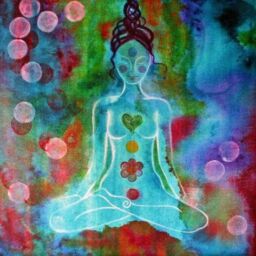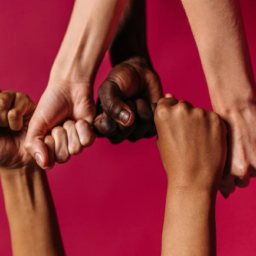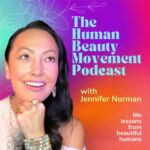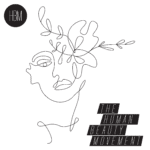
Many of us define ourselves by our names, roles, responsibilities, upbringing, occupation, religion…the list can look something like this: I’m a woman. I’m a sister. I’m a mom. I’m a wife. I’m divorced. I’m Asian. I’m a college graduate. I’m an entrepreneur. I’m a Christian. I’m a New Yorker. I’m a Democrat…But are these descriptions really who You are? No, they aren’t. These are merely labels that help to identify you to the rest of the world. They’re like your driver’s license or your social security number. They are ways for other peopled to discern your body from someone else’s body or classify your body with other bodies. But they are not You.
Who are You? According to Eckhart Tolle, You are not your body. You are not your thoughts. You are the awareness of your body and your thoughts. Why is that? How can that be? Imagine as we did earlier that the life that You have existed even before you were born as a human being. Imagine that You are energy, a soul that has existed ever since the beginning. And You have been sent to earth to occupy a human avatar to learn some valuable lessons, essentially to become aware of yourself. And so Your soul occupies a body, which grows and is shaped by human DNA into an ever-morphing state of physical being. And Your soul makes use of a human brain, which through electrical impulses learns, analyzes, computes, creates, connects. And Your soul registers emotions, stimulated by other energies in the form of sights, sounds, physical associations and invisible senses. And Your soul collects beliefs, striving to rationalize the unknown, striving for identity.
So very often, humans go through life on earth never discovering their true selves. They buy into the world that they see, the world that they can rationalize, and they fall into a common numbness that is very typically coined the human condition. It is much rarer that one is able to lift away the blindfold to gain a new, mind-blowing perspective of themselves. But things are changing. Through dissatisfaction with the status quo, dissatisfaction with the suffering of the human condition, and an urgent compulsion to gain real understanding, humans are starting to wake up. More and more humans are recognizing their true nature, which is the awareness that We are so much more than just human.
As far as we know, this universe is nothing but energy. Energy vibrates at certain frequencies to create light, color, sound and mass. When all matter is examined at the subatomic level, it becomes evident that the matter on earth is predominantly composed of space. The separation of one human to the air around that human to the next human to the chair that human is sitting on is mostly made up of space and vibrating energy.
So, with our eyes, we see life from one dimension. We fabricate life through a lens that we develop and shape based upon incidences past and present. Our bodies and our minds react through human programming to act based upon interpretation. In essence, the world can be viewed as that video game, whereby the goal of the game is to find Our way back home.
Be an Observer
Without greater awareness for “the big picture”, it’s easy to get caught up in life’s games. It’s natural to have mental and physical reactions to stimulus that can be perceived as comforting or antagonistic. What’s more difficult is to zoom out of the situation and see it for what it is. Try this exercise. Imagine You are able to float out of your body. You are now Your soul body glancing back at you. What do you look like? What is your disposition? What troubles this person You are looking at? What would You say to her to help her see how special she is? What advice would You give? Try stepping out of your own skin on a daily basis, or even more frequently if you can. Become an observer. Witness as an objective third party the situation at hand. Does this give you a better ability to assess the situation with a sense of calm? With care? With greater understanding? What are your tendencies at any time of the day? Do you wake up excited and ready to enjoy all that the new day may bring? Or do you wish you didn’t have to get up at all?
Recognizing yourself objectively may not come so easily. It does take practice. Role playing with yourself, you may be able to talk yourself through issues and come to the realization of your reflexive tendencies. For example, you may observe, “When my husband comes home late, I notice that I sometimes doubt if he’s really at the office. I have a trust issue I need to address with him. This lack of trust could be hurting our relationship.” Or, “When my boss gives me an unreasonable amount of work, I notice that I tend to brace up with anxiety, but I try not to let it show. I have a problem communicating the amount of work that is reasonable for me to handle. This impediment to communication could be impacting my occupational well-being.”
It’s helpful to journal various situations, identify your feelings, and then when you’re able, set aside quality time to discuss the situation with the other person involved, strive to remain that objective observer. It helps to remove the heat and emotion from the situation so that you can work through your feelings more productively, without escalation. Striving for discourse over confrontation and understanding over aggression is the ideal goal.
Acknowledging the Pressure
When you’re striving to succeed, pressure is inevitable. Growing up, you’re pressured to fit in but want to stand out. Later in life you’re pressured to do well in school and choose the right career. After that, there’s pressure to find the perfect partner, be the perfect wife, be the perfect mom, attain the perfect life, and so on. The desire to win in life breeds pressure. And certainly, pressure can be a good thing. Motivation is healthy. Wanting to get the most out of life is positive. Yearning to learn more and see more and experience more is a fundamental part of human growth.
There will be times when it feels like the pressure becomes too much. There will be times when the world throws everything at you at once. There will be countless times when life just isn’t fair. On top of it all, health problems and work problems and family problems and social problems will pile on top of you all at once. All of these pressures are going to make you feel overwhelmed. Life will seem like it’s too hard to cope with. You are going to think that you’re too weak and incapable and insignificant to deal with it all.
Acknowledging these feelings is an important part of the process. Know that your feelings are valid and normal – truly there is nothing wrong with you for feeling the way you do. In these moments when things get really overwhelming, it is time to get in your figurative (and perhaps literal) bathtub to take a time out and mentally get away from it all, even if only for a few moments. Nurture your mental health first – it may be the thing that saves you. Right now, in this moment, there is nothing more important than You taking care of you.
Acknowledging the Pain
What happens when someone close to you who is supposed to love you really hurts you, be it physically or emotionally? When the parent you looked up to assaults you? When the spouse you loved leaves you for another woman? When the friend you trusted uses you advance her own career? How do you cope with all the hurt, anger, humiliation, and rage? How do you not want to just end it all? In some cases, the physical or emotional pain is a result of an accident that we cannot come to terms with. Bad luck. You might be left thinking, “What did I do to deserve this? Why do bad things always happen to me? Why is God mad at me?” You might be living with unsettled anger and resentment inside. In other cases, the physical or emotional pain is a result of intentional malice. Someone or some people deliberately planned to do you harm. Perhaps it was jealousy, fear, hatred, ignorance, or anger on the part of the other. The color of your skin. The projections others have on “your kind.” The opinion that you don’t deserve all you have so it should be taken from you. Perhaps those negativities flowed both ways, and you were the injured party as a result. What about justice? What about fairness? What about rights? What about love? Certainly, those virtues are nowhere in sight when the eyes are malicious.
The issue with society is that pain avoidance has become the go-to “treatment”. When we are faced with a problem, we often ignore it or numb it. Opioids, alcohol, food, sex, retail therapy…these things may temporarily help us forget our worries and provide comfort, but they don’t make the problem go away. And then when the problem resurfaces, we go and ignore it or try to numb it again. And again. And again. We’ve become a society of addicts. We try numbing our problems away so they don’t hurt so much, but the problems dig in, like more obstinate weeds with stronger roots.
What’s a better way to release the pain? How can you move on through life with happiness in your heart when the world is so seemingly cruel? First, acknowledge your feelings. Acknowledge the hurt. Acknowledge the pain. Acknowledge the suffering. Let it out. Scream and cry and be upset. It’s okay not to bottle it all in. Once you have acknowledged your own pain, you may or may not be ready to acknowledge the other person’s pain. It takes otherworldly strength to do that. It might take a lot of time. The hope is that when someone else wrongs you, you will one day be able to look upon that person with compassion. One day, you might be able to see that they too must be suffering to have caused such an infliction. One day, you might understand that inside that person, tremendous sadness, insecurity or fear must exist for him to have acted in a way that would intentionally harm another. One day, you might be able to choose love to conquer hate. All that in due time. Right now, simply acknowledge without self judgement your feelings, and breathe.
Acknowledging the Triggers
How much does the approval of others affect your mood? When you get praise and accolades, does it make your day? When you get criticism and judgement, do you get offended? Many of us were raised to please people and take their opinions to heart. It is human nature to feel dismayed when someone second guesses our decisions, questions our skills, dismisses our suggestions, or belittles our point of view. We can so easily get wrapped up in the small-minded commentary of neighbors, acquaintances, friends and family members. It’s also common for us to read into people’s banter, assuming a jab, slight or dig is tucked inside slanted words. We fret over political correctness, because the world has become sensitized to labels and cultural appropriation and prejudice.
There is an inherent sense of belonging that we’re all seeking. We want to be celebrated for our uniqueness, but what we really want is acceptance. Acceptance means that we fit in, that the tribe welcomes us, and we are secure. It’s no wonder that we start seeking approval, acting and dressing and living our lives in a way to make others impressed. When we do this, we are building our lives upon a foundation that is not necessarily our own. The satisfaction that we receive is in the collection of gold stars that we get throughout our lives. So, it’s no wonder that once we receive a word of disapproval or disappointment or critique from the tribe, it’s as though our gold stars are erased. Why do these things bother us? Why does it matter? When we do, we give so much of our power to others, over big and small things. Even the most confident women can have a weak spot when it comes to approval seeking. Truthfully, the rampant blazoning of designer logos flashed across purses, shoes, t-shirts and sunglasses are case in point as to the conformist culture in modern society among the elite. For the most part, marketers know that egoistic people are seeking acceptance and praise either to fit in or to elevate their social status in relation to others. And so, we spend outrageous dollars to purchase branded products. We do so to define ourselves and establish social desirability without realizing we are actually duping ourselves and others – victims who outwardly compensate for deeply rooted emptiness and subconscious insecurities.
Acknowledging the triggers that cause us to react defensively helps us recognize our ego insecurities. Being self-assured enough to deflect negativity and not let it bother us is golden. Like when LeBron steps up for a free throw at an away game. He ignores the trash talk from fans and opponents and instead focuses on his performance to confidently sink the shot. Then he moves on to finish the game with a win. If his feelings got hurt every time he heard trash talk, he would lose every game. So ask yourself: when you are the subject of an offense, does it sink into your psyche, take root, and impact the way you think about yourself? If so, snap out of it, because the trash talk is all part of the game. Remember, the offense will only hurt your feelings if you actually give it permission to hurt your feelings. Without your permission, it has no power.
Acknowledging the Isms
But what if the offense is way more than just trash talk? What if the offense is due to power imbalance? What if it is part of a systemic issue of inequity and injustice? What we are talking about here are “Isms”: Racism. Sexism. Ageism. Classism. Ableism…This is when the biases of people in positions of privilege or power do considerable harm to whole populations of other people in society. More than mere name-calling, biases due to “Isms” create societal disfunction that deteriorates multiple aspects of populations’ well-being, including emotional, occupational and financial.
Over the course of history, those populations that have been persecuted seem to pass their pain down from generation to generation. Some say that their pain has carved itself into the DNA of future generations who may not even be aware of the original atrocities. Some people question if the pain will ever go away. In some cases, sweeping amends may have been attempted to remedy injustices, but in many cases, even the sincerest apologies are still left unforgiven. Why is that? Why is it so hard to forgive? While these Isms won’t go away overnight, responding to hate with hate or anger with anger creates conflict in which there may ultimately be a victor. But the defeated will remain with wounds subject to diffusing into a new set of biases, cascading into the future, morphed in some other form. Take for example the colonizing of America to escape the power struggle under British rule. Did Americans not quickly turn around and strive to exert their own power over indigenous natives and African slaves? I can’t help but wonder if love truly is the only way to bring about long term healing. As difficult an issue that Isms bring about for us all, it seems that honoring agape love is the only way the world might recover from the ills of the past.
Acknowledging the Authority Relationships
When we were children, we sought the praise of our parents. In school, we competed for blue ribbons. At work, we reached for the brass ring. There was always something encouraging, motivating, pushing, expecting us to accelerate, grow and succeed: the approval of authority. The relationships each of us have with authority figures varies greatly. Some may argue that parental relationships are central to all subsequent relationships with authority figures.
When a relationship is respectful and nurturing, it can blossom into a most productive outcome. But what happens when power is abused? How do we feel when role models let us down? What do we do when the higher ranks make bad decisions? In situations of child abuse or domestic violence, how do you recover from the pain? Well, you can pretend things are ok, or you can speak up.
Remember when your parents could do no wrong? There was a time and place when they seemed perfect. Then one day, the looking glass was shattered. We stared straight into the faces of adult imperfection. It threw our whole world off balance. We lost trust, respect and admiration all at once. We realized in an instant that they, too, were human, and susceptible to wrong-doing and error. I’m curious, how did they respond when they were caught? Did they try to hide it or explain it away? Were they upfront about it? Did they come forward with a declaration of their mistake, apologize for it, and ask for forgiveness? Or did they stand in defiance, unapologetic, with an air that they were above needing to explain their behavior? Maybe you don’t even remember, but these learnings are likely planted inside your subconsciousness, shaping your attitude toward figures of authority.
We are also subject to prejudicial attitudes towards authority. All cops are bad. All politicians are crooked. All CEOs are greedy. Just as we would want to abolish prejudice towards ourselves, we must also seek to abolish prejudice we have towards others. It is the only way we will work towards real understanding, fairness and function.
Let us acknowledge our views for what they are. Let’s understand our underlying tendencies towards those in positions of power to help build more constructive partnerships in the future. Simply being aware that these inherent viewpoints exist in our psyches can help us face them and perhaps bring forth communication or change for the betterment of everyone’s happiness.
Acknowledging the Patterns
Habits, both positive and negative, have a tendency to take up space in our day without us even realizing it. The things we do without even thinking get ingrained in our behavior and practically become part of our personalities. There is an element of mindlessness about habitual activity, like an autopilot flow state. It’s interesting how our habits are so noticeable to others, but almost unrecognizable to ourselves until someone points them out or we’ve somehow become more aware of the effect of those habits. You may not even realize how often you say “um” during a conversation or gesture in a particular way until you see a video of yourself. You may not realize that you’ve eaten the whole pizza until you’re staring at an empty pizza box. If there are habits in your life that are taking up time and energy without you knowing it, it’s best for them to be good ones. Habits like taking deep, cleansing breaths. Like smiling for no reason. Like having your thoughts wander to cheerful times and hobbies you’d like to consider. Like waking up and not checking your phone. Like complimenting yourself and others.
When do habits become addictions? The transition is often innocuous, happening over an extended period of time. Gradually, a dependency develops that begins to cause harm to one or more aspects of your wellness. Gambling. Binge shopping. Smoking. Overeating. Sex. Opioids. Sedatives. Gaming. Social media. None of these in moderation is unhealthy, however the eventual reliance on them for solace, comfort, ecstasy or self-worth can engulf you without you even realizing it. Soon, there is a loss of control and a feeling like you cannot do without the dependent activity. Modern society feeds addiction culture. Buy more. Have more. Do it now. Don’t wait. Act fast. Don’t think. Just do. Have your habits become addictions? If you were to take an honest look at your average day, week, month or year, would you or someone that loves you feel the slightest concern over certain of your behaviors? Are there activities you partake in that you know help you cope? The first thing to know is that it is ok. It is ok that you need to cope, need help, need the ability to find a release for stress, anxiety, sadness, or any other state that may be rectified by a serotonin, endorphin or dopamine release, aka the feel-good chemicals in our brain and nervous systems. Remember, the acknowledgement is part of the healing. Accepting and loving yourself where you are right here is what matters right now. Considering alternative paths that may be even more fulfilling to you on your lifelong quest for happiness and balance is the next practice. Once this consideration sets in, you have already opened the door to greater wellness.
10 Mantras for Becoming Self-Aware
A mantra is a way to affirm your wishes to yourself. In this self-awareness practice, you are affirming your desire to know yourself with true honesty. Take a moment now to honor the light, the dark, the highs, and the lows within you. Without self-criticism, simply acknowledge the humanness of your being. You can take any of the suggested mantras below and say them to yourself quietly or out loud. You can read all of them, or you can take a single affirmation and repeat it over and over to yourself. You can hang this list on your wall, or you can keep it by your bedside. Whatever feels right for you, any time, any day, enjoy knowing that you are stepping into greater self-awareness.
I am becoming self-aware
I am open to learning more about every aspect of myself
I am grateful for the insight to see myself clearly
I am the most powerful mirror into my own soul
I am ready for a fresh start to the rest of my life
I am lovingly finding new things out about myself every day
I am becoming my own best friend
I am waking up to the real me
I am lovingly examining my inner thoughts and feelings
I am taking time to understand myself

















